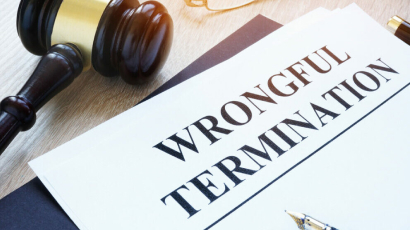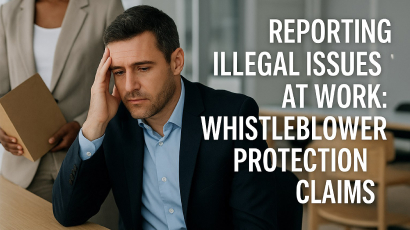Wrongful Termination in California
Have you been fired for speaking up, taking protected leave, or simply being yourself? EFLL fights for workers wrongfully terminated in violation of California and federal law.

When Wrongful termination occurs?
Wrongful termination occurs when an employer fires an employee for reasons that are illegal under state or federal law. While California is generally an “at-will” employment state, that does not give employers a free pass to fire someone for discriminatory, retaliatory, or otherwise unlawful reasons.
What Qualifies as Wrongful Termination?
Wrongful termination may involve firing someone for:
- Reporting harassment, discrimination, or illegal conduct
- Taking medical leave under FMLA, CFRA, or Pregnancy Disability Leave (linked to leave)
- Requesting accommodations for a disability or religious belief (linked to reasonable accommodations)
- Participating in a workplace investigation
- Filing a workers' compensation claim (linked to WC)
- Refusing to engage in illegal activity (linked to whistleblower)
Such terminations violate the California Fair Employment and Housing Act (FEHA), California Labor Code sections 1102.5, 98.6, and 132a, as well as Title VII of the Civil Rights Act.
Protected Activities
California law protects employees from being fired for engaging in “protected activity,” including:
- Whistleblowing or reporting violations
- Requesting or taking protected leave
- Complaining about unpaid wages or missed breaks
- Supporting co-workers in legal claims
- Requesting accommodations for a disability or pregnancy
These protections are enforced under Labor Code § 1102.5, FEHA, the Family and Medical Leave Act (FMLA), and the California Family Rights Act (CFRA).

At-Will Employment vs. Illegal Firing

California is an at-will employment state, which means employers can fire employees for any reason—or no reason at all—unless that reason is illegal. Illegal firings include those motivated by:
- Discrimination (race, gender, disability, age, religion, sexual orientation, etc.)
- Retaliation for exercising legal rights
- Refusing to break the law
Just because your employer claims you were let go for performance or restructuring doesn’t mean it’s true. At EFLL, we know how to uncover the real reason.
Real Case Examples
EFLL has successfully represented clients in cases including:
$1,950,000 settlement for a worker fired after reporting sexual harassment
$950,000 for a hospital employee terminated after requesting pregnancy accommodations
$2,650,000 award for whistleblowers fired for reporting toxic waste disposal.
These victories reflect our commitment to holding employers accountable.
How EFLL Fights Back
Our wrongful termination attorneys:
Investigate the timeline, documents, & witness accounts
Subpoena personnel files & internal communications
Depose managers & HR reps under oath
Highlight inconsistencies and policy violations
Present Powerful Emotional Distress & Economic Damages Evidence
We don’t just file lawsuits. We build strategic pressure until employers pay attention.
Don’t wait! Contact us if you wrongfully terminated!
If you believe you were wrongfully terminated, don't wait. Evidence disappears quickly and deadlines apply. Call EFLL for a free, confidential consultation with an employment attorney who will fight to make it right.
Free Case Consultation with in 24 hours
Don’t lose benefits due to delay. No-fee guarantee
Request A Free Consultation:
READ OUR BLOG

Wrongful Termination in California: What Counts and What Doesn’t
Getting fired from your job can be stressful, humiliating, and financially devastating. But not every firing is illegal. In California, many workers are employed “at-will,” meaning they can be terminated for almost any reason—or no reason at all. So what actually counts as wrongful termination under California law?

Fired Because of a Disability? What to Do Next
Losing your job is devastating — but it’s even worse if the reason is rooted in disability discrimination. While employers can terminate employees for legitimate reasons, firing someone solely because of a disability is unlawful. If you were fired shortly after disclosing a disability or requesting an accommodation, it may be a red flag.

Reporting Illegal Issues at Work: Whistleblower Protection Claims in California
If you’ve witnessed illegal activity in the workplace — and had the courage to speak up — California law has your back. Employees who report violations of law, unsafe conditions, fraud, or harassment are protected under some of the strongest whistleblower statutes in the country.
Watch our videos!
OFFICE LOCATIONS
EMPLOYEES FIRST LABOR LAW - LONG BEACH
- One World Trade Center, 8th Floor Long Beach, CA 90802
